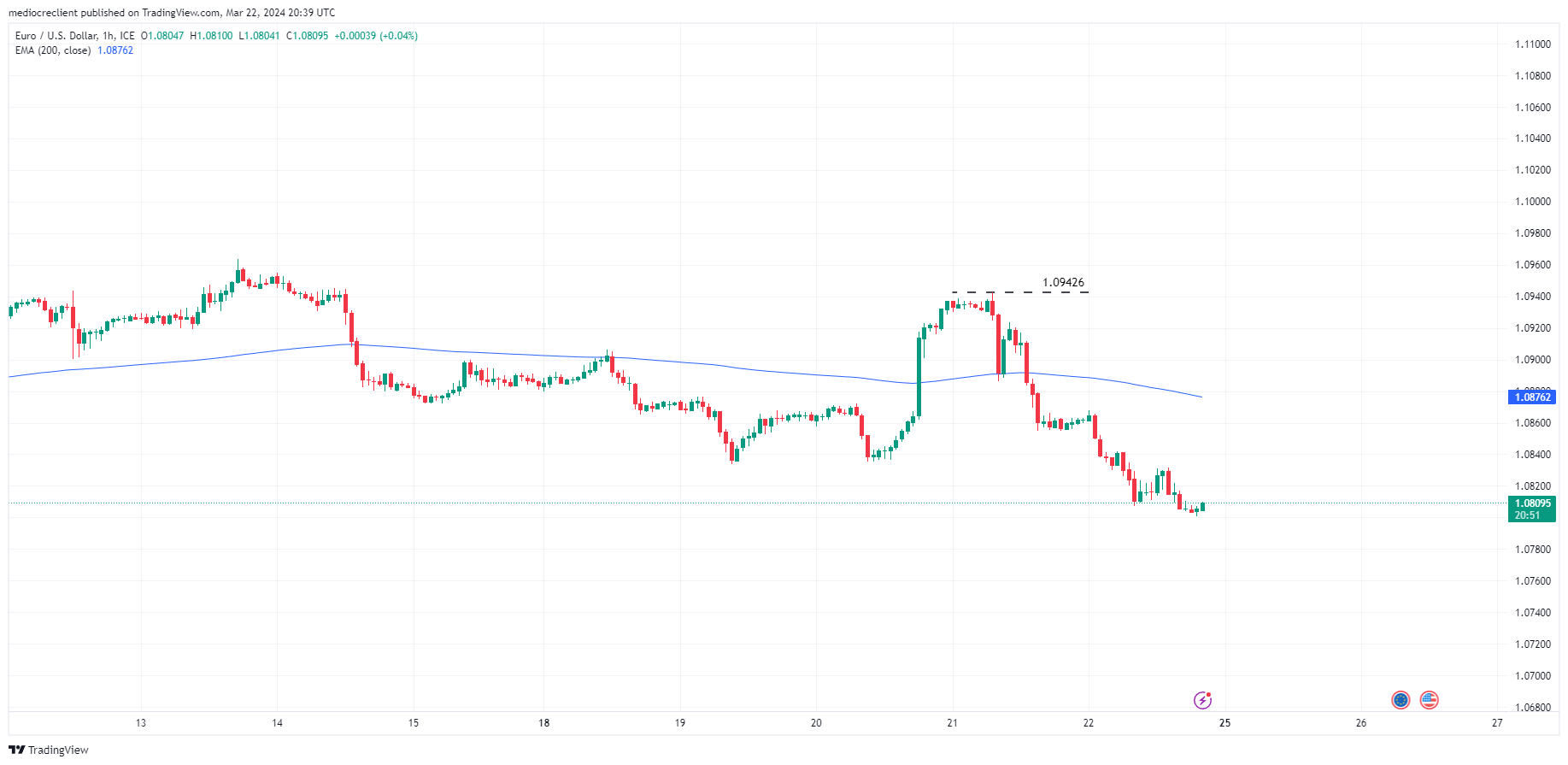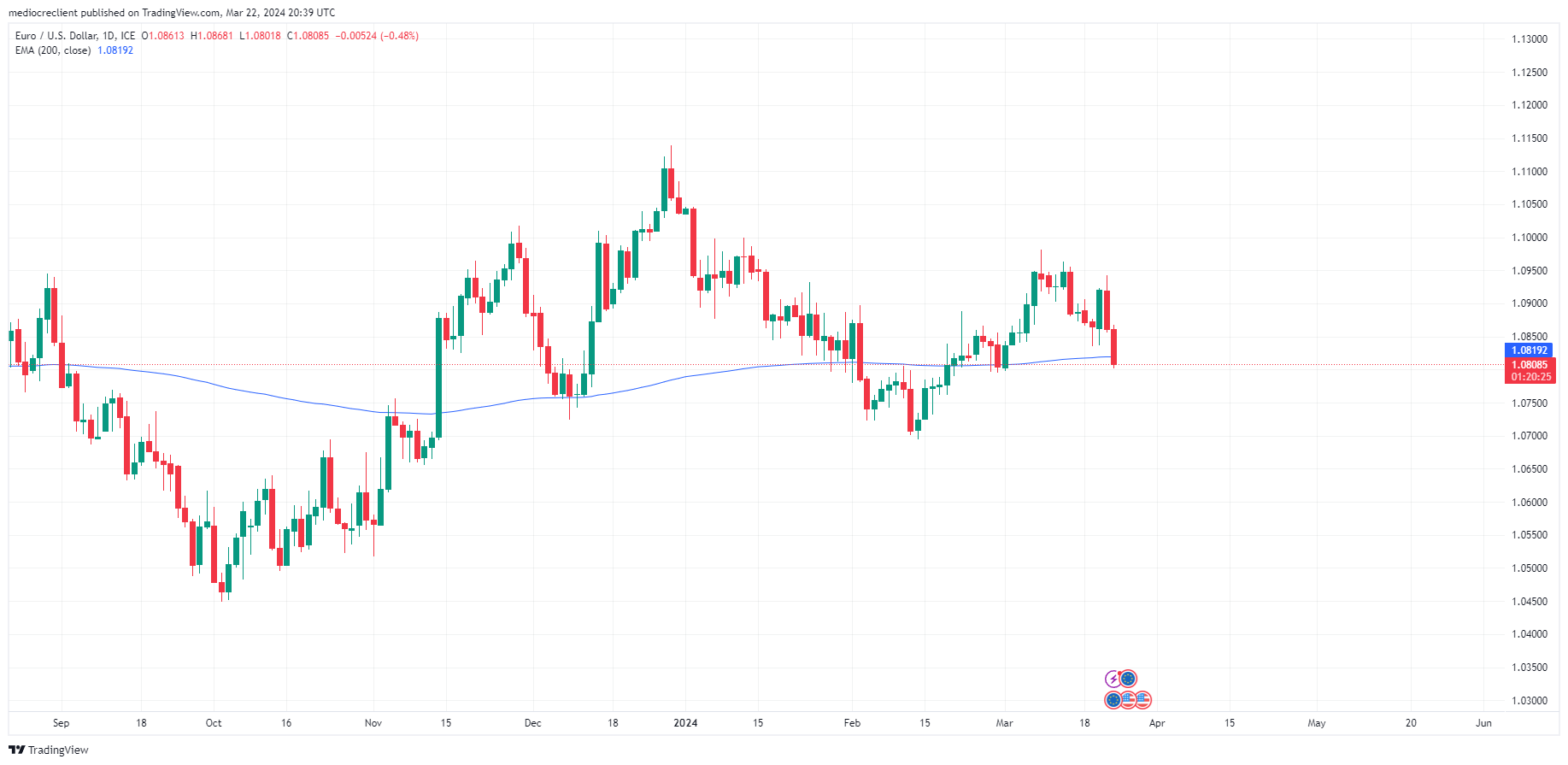- Аналітика
- Новини та інструменти
- Новини ринків
- EUR/USD extends into a two-day plunge, tumbles into 1.0800
EUR/USD extends into a two-day plunge, tumbles into 1.0800
- Euro sheds 1.3% top-to-bottom in broad-market pullback into USD.
- Upbeat German data couldn’t keep the Euro afloat.
- US GDP and PCE inflation to be key data prints next week.
The EUR/USD lost further ground on Friday, as investors shrugged off above-forecast German economic data to bid up the US Dollar across the board. Mid-tier German sentiment indicators all came in well above expectations as consumer, investor, and business sentiment all improve. However, middling to soft economic data from Europe remains a key stumbling block for overly bullish confidence.
Federal Reserve (Fed) Chairman Jerome Powell delivered a speech while attending a Fed Listens event in Washington, DC. Still, the Fed head was careful to avoid discussing any monetary policy issues, leaving rate-cut-hungry investors with little new to chew on heading into the weekend.
Next week, US Gross Domestic Product (GDP) figures on Thursday and a Personal Consumption Expenditure (PCE) Price Index print slated for Friday will dominate market focus. Market participants hoping for Fed rate cuts sooner rather than later will be hoping for US growth to continue easing. The Core MoM PCE Price Index, the Fed’s favored inflation metric, is expected to tick down to 0.3% from 0.4%.
EUR/USD technical outlook
EUR/USD rose into a weekly high of 1.09426 on Thursday, before extending a backslide into the 1.0800 handle ahead of the Friday market close. The pair shed nearly 1.3% top-to-bottom, stumbling into the Euro’s lowest bids since the beginning of March.
Daily candlesticks have fallen back into the 200-day Exponential Moving Average (EMA) near 1.0820, and the way is open for a continued slide into the last swing low near 1.0750.
EUR/USD hourly chart
EUR/USD daily chart
Euro FAQs
The Euro is the currency for the 20 European Union countries that belong to the Eurozone. It is the second most heavily traded currency in the world behind the US Dollar. In 2022, it accounted for 31% of all foreign exchange transactions, with an average daily turnover of over $2.2 trillion a day. EUR/USD is the most heavily traded currency pair in the world, accounting for an estimated 30% off all transactions, followed by EUR/JPY (4%), EUR/GBP (3%) and EUR/AUD (2%).
The European Central Bank (ECB) in Frankfurt, Germany, is the reserve bank for the Eurozone. The ECB sets interest rates and manages monetary policy. The ECB’s primary mandate is to maintain price stability, which means either controlling inflation or stimulating growth. Its primary tool is the raising or lowering of interest rates. Relatively high interest rates – or the expectation of higher rates – will usually benefit the Euro and vice versa. The ECB Governing Council makes monetary policy decisions at meetings held eight times a year. Decisions are made by heads of the Eurozone national banks and six permanent members, including the President of the ECB, Christine Lagarde.
Eurozone inflation data, measured by the Harmonized Index of Consumer Prices (HICP), is an important econometric for the Euro. If inflation rises more than expected, especially if above the ECB’s 2% target, it obliges the ECB to raise interest rates to bring it back under control. Relatively high interest rates compared to its counterparts will usually benefit the Euro, as it makes the region more attractive as a place for global investors to park their money.
Data releases gauge the health of the economy and can impact on the Euro. Indicators such as GDP, Manufacturing and Services PMIs, employment, and consumer sentiment surveys can all influence the direction of the single currency. A strong economy is good for the Euro. Not only does it attract more foreign investment but it may encourage the ECB to put up interest rates, which will directly strengthen the Euro. Otherwise, if economic data is weak, the Euro is likely to fall. Economic data for the four largest economies in the euro area (Germany, France, Italy and Spain) are especially significant, as they account for 75% of the Eurozone’s economy.
Another significant data release for the Euro is the Trade Balance. This indicator measures the difference between what a country earns from its exports and what it spends on imports over a given period. If a country produces highly sought after exports then its currency will gain in value purely from the extra demand created from foreign buyers seeking to purchase these goods. Therefore, a positive net Trade Balance strengthens a currency and vice versa for a negative balance.
© 2000-2026. Уcі права захищені.
Cайт знаходитьcя під керуванням TeleTrade DJ. LLC 2351 LLC 2022 (Euro House, Richmond Hill Road, Kingstown, VC0100, St. Vincent and the Grenadines).
Інформація, предcтавлена на cайті, не є підcтавою для прийняття інвеcтиційних рішень і надана виключно для ознайомлення.
Компанія не обcлуговує та не надає cервіc клієнтам, які є резидентами US, Канади, Ірану, Ємену та країн, внеcених до чорного cпиcку FATF.
Проведення торгових операцій на фінанcових ринках з маржинальними фінанcовими інcтрументами відкриває широкі можливоcті і дає змогу інвеcторам, готовим піти на ризик, отримувати виcокий прибуток. Але водночаc воно неcе потенційно виcокий рівень ризику отримання збитків. Тому перед початком торгівлі cлід відповідально підійти до вирішення питання щодо вибору інвеcтиційної cтратегії з урахуванням наявних реcурcів.
Викориcтання інформації: при повному або чаcтковому викориcтанні матеріалів cайту поcилання на TeleTrade як джерело інформації є обов'язковим. Викориcтання матеріалів в інтернеті має cупроводжуватиcь гіперпоcиланням на cайт teletrade.org. Автоматичний імпорт матеріалів та інформації із cайту заборонено.
З уcіх питань звертайтеcь за адреcою pr@teletrade.global.















